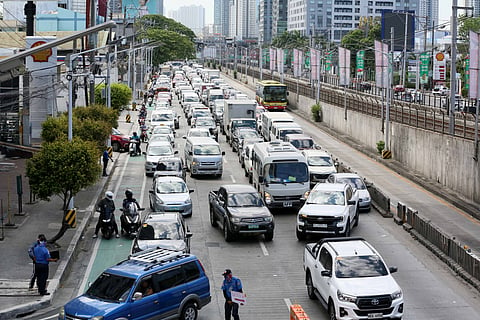
- NEWS
- the EDIT
- COMMENTARY
- BUSINESS
- LIFE
- SHOW
- ACTION
- GLOBAL GOALS
- SNAPS
- DYARYO TIRADA
- MORE

Election lawyer Atty. Romulo Macalintal on Sunday said the suggestion by the Metropolitan Manila Development Authority (MMDA) to ease traffic in Metro Manila by requiring motorists to pay a toll fee on EDSA should be reviewed.
Macalintal said the suggestion seemed not only impractical but could also constitute double taxation, as vehicle owners already pay the “road user’s tax” under Republic Act No. 8794, or the Motor Vehicle User’s Charge Law, for the privilege of using roads.
The same law prohibits the imposition of other taxes or charges of similar nature by any political unit.
“In lieu of such proposal, I reiterate my recommendation that, to ease traffic congestion in Metro Manila, (which I have been suggesting since 1997): A four-day work per week in all government offices in Metro Manila where everyday, thre cities in Metro Manila will have no work on a staggered or alternate basis,” said Macalintal.
He added that, for instance, there would be no work in all government offices in Quezon City, Las Piñas City, and Manila on Mondays; Pasay City, Taguig City, and Caloocan City would have no work on Tuesdays; Mandaluyong City, Muntinlupa City, and Paranaque City on Wednesdays; San Juan City, Pasig City, and Makati City on Thursdays; and Malabon, Navotas, Valenzuela, and Pateros on Fridays.
The combination of cities or areas in the alternating arrangement of one day off per week will depend on population size or traffic conditions, as may be determined and recommended by the MMDA.
A good example of the effect of this proposal is when Manila and San Juan City celebrate Manila Day and the Feast of St. John the Baptist, respectively, every 24 June, when light traffic is experienced because of the holidays in these two big cities.
And only recently, on 13 January, when the Iglesia ni Cristo held a National Rally for Peace and work in government offices and classes were suspended in Manila and Pasay City, traffic was very light.
Macalintal said the staggered system of giving one day off per week will certainly ease the traffic situation in Metro Manila, considering the substantial number of private vehicles that will not be used during this workday off, which will ultimately result in savings on gas and fuel. This will also allow jeepney and bus drivers to double or triple their daily trips, increasing their daily income. Employees will save a lot from a day off in terms of transportation expenses, food, and clothing.
To compensate for the eight-hour loss from the one day off, the working hours may be adjusted accordingly to comply with the 40-hour workweek requirement.
Employees may work from 7 AM to 12 PM and 1 PM to 6 PM for four days, which is also 40 hours a week.
“At any rate, it is very common that most employees stay late in the office even after office hours or come to work very early in the morning to avoid traffic. A little sacrifice from all concerned people and offices is not too much to ask for at this time when everybody is called upon to cooperate for the greater welfare of the public. As a matter of fact, this four-day work week is already being practiced in some government offices, hence, there is no reason why it could not be implemented nationwide.”
Lastly, Macalintal said the proposal may also be adopted by private entities that may be similarly minded to join the government in its effort to solve this traffic problem and save energy. In a word, the government may be the first to enforce a four-day workweek or one day off per week as an "experimental phase" before the private sector could participate. It could also be adopted in other metro cities, like Cebu, Davao, and the like.
